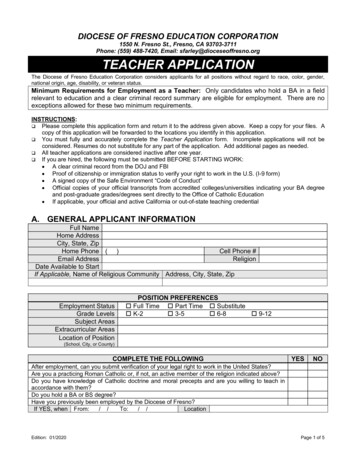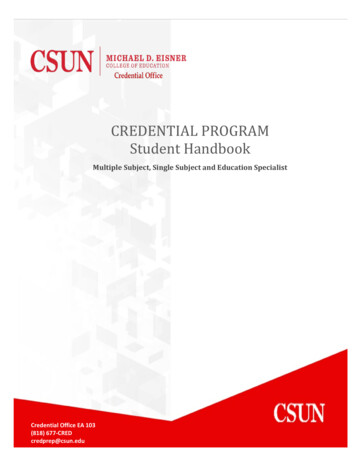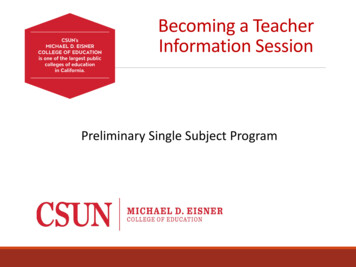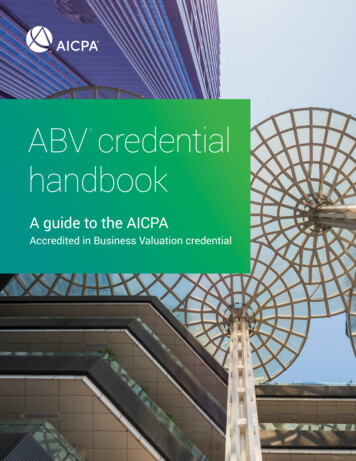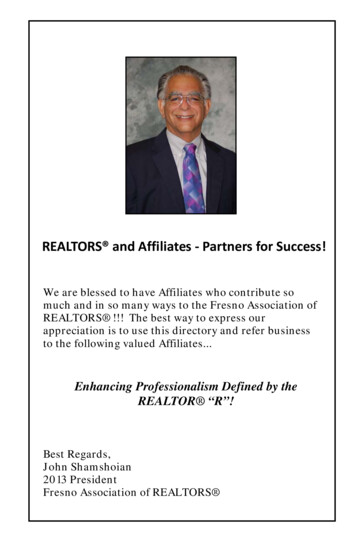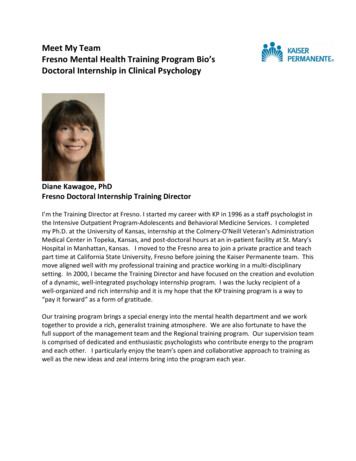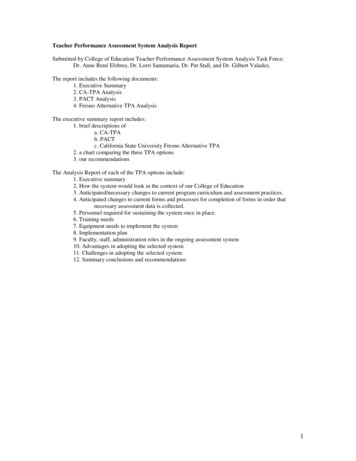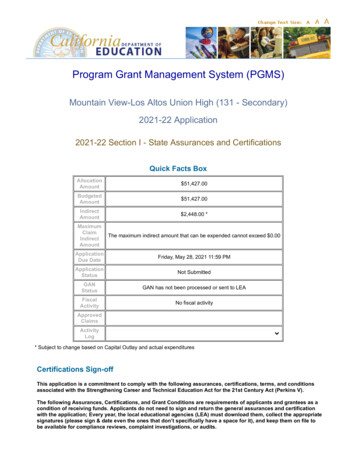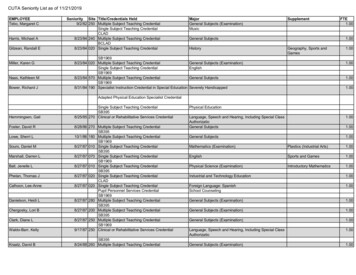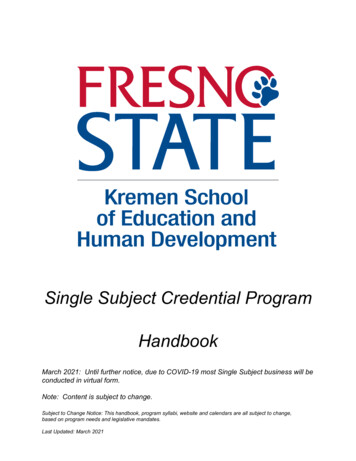
Transcription
Single Subject Credential ProgramHandbookMarch 2021: Until further notice, due to COVID-19 most Single Subject business will beconducted in virtual form.Note: Content is subject to change.Subject to Change Notice: This handbook, program syllabi, website and calendars are all subject to change,based on program needs and legislative mandates.Last Updated: March 2021
TABLE OF CONTENTSKSOEHD OverviewVisionMission StatementGoals4444Program OverviewCandidate Professional Dispositions56About the Single Subject Credential ProgramSingle Subject Credential Program Faculty & StaffState Admission RequirementsProgram StructureProgram PathwaysProgram FacultySingle Subject Credential CourseworkAssessmentProgram StandardsObservation Rubric & EvaluationsOverview of Teacher Performance AssessmentsGeneral Credential Program Policies for all Coursework & Clinical PracticeGrade Point Average RequirementIncomplete GradesUnsatisfactory GradesClinical Practice ObligationsClinical (Student Teaching) PlacementCredential Candidate Misconduct or ConcernsDismissal from Clinical Practice PlacementCredential Program DisqualificationReinstatement Appeal Process for Disqualified CandidatesStudent Dispute Resolution alifications of StakeholdersQualifications for School Site Field PlacementsQualifications and Role Expectations for Principals & School Site AdministratorsQualifications and Role Expectations for University CoachesQualifications for Mentor Teachers25252627272
Program PoliciesProgram CompletionProgram Assignment CompletionOutside CommitmentsAbsencesSubstitute TeachingProfessional DressProfessional Ethical BehaviorProgram Resolution Process292929292930303030Professionalism Policy30University Student Support353
KSOEHD OverviewVisionThe Kremen School of Education and Human Development (KSOEHD) is a center foracademic excellence and collaboration in the fields of education and counseling.Graduates will be community leaders who advocate high standards and democraticvalues with attention to professional ethics and diversity. Integration of educationaltechnology and performance assessment is essential to all programs.Mission StatementThe Kremen School of Education and Human Development's mission is the recruitment anddevelopment of ethically informed leaders for classroom teaching, education administration,counseling, and higher education. This NCATE-accredited unit fosters the candidatedispositions of collaboration, valuing diversity, critical thinking, ethical judgments, reflection, andlife-long learning. Our mission is realized through a framework of teaching, scholarship, andservices that addresses regional, state, national, and international perspectives.Goals To recruit qualified candidates, who are representative of the diversity in our community,into the fields of education and counseling, beginning with students in the public schools. To be at the cutting edge of the application of best practice models and educationaltechnology. To prepare education professionals who have a command of content knowledge andpedagogy, and who continuously strive to improve their practice. To support the lifelong development of practicing professionals with services andprograms including the doctorate. To prepare professionals who are committed to leadership and service in diversecommunity settings. To integrate performance assessment as a key evaluation technique in each of ourprograms. To sustain a university work environment that is exemplary in its humanity, ethics,effectiveness and intellectual vitality. To secure, through advancement efforts, the supplemental funding needed to provide themargin of excellence for programs and special initiatives. To be the higher education partner of choice for the public schools and other relevantinstitutions of the five counties we serve in the Central Valley.4
Program OverviewThe Credential programs at Fresno State are focused on preparing innovative, social justiceoriented educators who are highly prepared to meet the diverse needs of students in the CentralValley. Through a program of study infused with inquiry, culturally sustaining practices,developmentally appropriate practices, and Universal Design for Learning, program graduateswill be prepared to design and implement research-based curriculum that builds on studentstrengths and responds to student academic, social, emotional, and developmental needs.InquiryInquiry, also known as action research, is foundational to candidate preparation at Fresno State.Inquiry is a process of identifying puzzles of practice (Yun & Bennett 2018) as they arise in aclassroom setting, referencing research related to the issue, collecting and analyzing data togain a deep understanding of the issue, and methodically implementing interventions to addressand resolve the issue. Inquiry is essential to elevating educators from implementers of genericcurriculum to professionals who are capable of differentiating instruction to meet the range ofneeds present in any classroom context. Inquiry also encourages teachers to collaborate, learnfrom one another, and disseminate findings within their communities of practice, a necessaryskill for participation in school site learning communities.Culturally Sustaining PracticesCulturally sustaining pedagogy (Paris, 2012), is a framework that focuses on the culturalexperiences and ‘ways of being’ that students bring with them to the classroom in order toensure that the curriculum is inclusive and asset based. In other words, a culturally sustainingframework serves to disrupt deficit perspectives and facilitates building upon the linguistic,cultural, familial, and social capital of the children in the context.Developmentally Appropriate PracticesA deep understanding of human development is essential to good teaching. In order forteachers to design learning opportunities that are appropriate for the learner’s current level ofdevelopment, candidates must understand various stages of development and know whichpractices will work best for learners at each of the various stages. Through a developmentallyappropriate practices framework, candidates learn how to engage their learners in ways that willmatch current developmental levels and stretch learners’ capacity within a zone of proximaldevelopment.Universal Design for LearningUniversal Design for Learning (UDL) is a framework that guides the development of flexiblelearning environments that can accommodate individual learning differences. A UDL frameworkguides teachers to provide multiple means of representation, action and expression, andengagement when designing learning opportunities to ensure that all students have the ability toaccess the content in ways that work best for them, represent their learning in a range of ways,5
and work in a manner that is most engaging in order to facilitate each student’s most impactfullearning.Candidate Professional DispositionsThe Kremen School of Education and Human Development faculty aims to foster thedevelopment of the following professional dispositions among our candidates. Candidatesincreasingly reflect these dispositions in their work with students, families, and communities.ReflectionCandidates develop the dispositional tendency to reflect on their professional practice. Wesupport the development of this disposition by having candidates regularly reflect on theirlearning and on their practice.Critical thinkingCandidates analyze situational contexts, resulting in a more informed decision-making thinking.We provide our candidates practice analyzing the implications of intrapersonal, interpersonaland contextual issues in educational settings.Professional ethicsCandidates learn to make well-reasoned ethical judgments. We foster this disposition byteaching ethical decision-making that relies on reflection and results in professional action.Valuing diversityCandidates are able to work effectively with diverse populations and recognize the importanceof valuing of cultural, linguistic, cognitive, and physiological diversity. We promote thisdisposition through experiences in educational settings with diverse populations andopportunities to discuss, observe, and reflect on the benefits of valuing diversity.CollaborationCandidates learn and practice the skills of collaboration in their classes and in their fieldwork.Furthermore, we model collaboration in our work with one another and with the largereducational community.Life-long learningCandidates demonstrate a commitment to lifelong learningabout their profession and beyond. We foster this disposition through pre-professionalexperiences that bring the candidate into the profession in meaningful ways and by acquaintingthem with opportunities for continuing professional growth.6
Note: Measurement of these dispositions will be collected via TK20 using a measurement titledPre and Post-Dispositional Survey collected at the beginning of initial and final student teaching,Candidates are also expected to abide by the program’s professionalism policies.About the Single Subject Credential ProgramThe California Single Subject Teaching Credential authorizes the holder to teach the specificsubject(s) named on the credential in departmentalized classes, such as those in most middleschools and high schools, in grades preschool, K–12, or in classes organized primarily foradults.Candidates may ONLY apply to “one” of the following subject areas: Agriculture, Art, Biology,Chemistry, English, French, Geological Science, Industrial Technology, Mathematics, Music,Physical Education, Physics, Social Science, or Spanish.Note: Due to the academic subject matter area requirements for the state-mandatedassessment expectations of the FAST for Single Subject Credential Program Candidates,credential option exchanges are prohibited.Teaching English LearnersFresno State's Single Subject Credential Program includes content for teaching English learnersthat authorizes the credential holder to provide instruction for English language developmentand specially designed academic instruction in English within the subject area and grade levelauthorization of the Single Subject Teaching Credential.Preliminary Single Subject CredentialCandidates in our program are working toward a Preliminary Single Subject Credential. Once allcredential program requirements are completed, the candidate applies to the CaliforniaCommission on Teacher Credentialing (CCTC) for a preliminary single subject credential. Thepreliminary single subject credential authorizes candidates to teach a specified subject in adepartmentalized classroom for a maximum period of five years.Single Subject Credential Program Faculty & StaffCredentials Office: ED 100Credentials Phone: 559-278-0300Single Subject Credential Program CoordinatorDr. Imelda BasurtoEmail: ibasurto@csufresno.edu7Teacher Internship Program (TIP)Email: internship@csufresno.edu
Single Subject EHD 154A SupportMs. Deborah BrownEmail: deborahB@mail.fresnostate.eduTK20 SupportOnline AdministrationEmail: tk20support@mail.fresnostate.eduSingle Subject Content AreasAcademic Department Coordinators/AdvisorsCredentials AnalystMs. Sherri NakashimaEmail: sherrin@csufresno.eduOffice of Clinical PracticeEmail: ocp@csufresno.eduCredential Admissions AnalystMrs. Renee FloresEmail: reflores@csufresno.eduState Admission RequirementsCalifornia State University Executive order 1077 Revised (Section 41100) establishes standardsfor admission to a teacher education preliminary credential and for entrance to a studentteaching experience. To be admitted to the single subject credential program, a candidate shallhave met all of the following requirements:GPA RequirementThe candidate shall have attained a grade point average of at least 2.67 in all baccalaureateand post-baccalaureate coursework or a grade point average of at least 2.75 in the last 60semester units attempted.Pre-Program Field ExperienceThe candidate shall have completed a documented field experience of at least 45 hours in aK-12 classroom or a documented field experience deemed equivalent by Fresno State.Prerequisite CourseworkThe candidate shall have completed the following prerequisite courses: EHD 50 (or equivalent)and CI 149.Academic Department Interview & Recommendation FormsThe candidate shall have demonstrated suitable aptitude for teaching in public schools, asdetermined by the campus. The process of making this determination shall include at least oneinterview with one or more campus faculty members and two recommendations.Demonstrated Personality and Character TraitsThe candidate shall have demonstrated personality and character traits that satisfy thestandards of the teaching profession. The assessment of the candidate shall be made by theteacher education faculty of the campus, who may also consider information from public school8
personnel and others. The campus may use tests, observations, and interviews for thisassessment. Fresno State requires candidates to sign a “Teacher Candidate Commitment” aspart of the admission process.California Basic Educational Skills Test (CBEST) ExaminationThe candidate shall have demonstrated proficiency in written and spoken English, asdetermined by the campus, and shall have taken an examination which has been determined bythe Commission on Teacher Credentialing (CTC) to meet the California basic skills requirement.Fresno State requires candidates to write a personal narrative and participate in an interview todemonstrate proficiency in written and spoken English.CTC ClearanceThe candidate shall have obtained a certificate of clearance as evidence of having undergonethe fingerprint and character and identification process required by the CTC.Subject Matter CompetencyThe candidate shall have demonstrated subject matter competency by the means appropriate tothe preliminary credential sought. The single subject credential candidate shall have achieved apassing score on any California Subject Examination for Teachers that is required for thecredential sought, or satisfactorily completed a subject matter program appropriate to thecredential and approved by the CTC. There may be additional departmental requirements.Admission Exceptions for GPA Requirements OnlyThe only admission exception considered is for a low GPA that does not meet the requirement.If a candidate has met all other admission requirements, but has a low GPA, a specialconsideration form may be completed and submitted along with the credential application.Candidates accepted under special consideration may be placed on a three (3) semesterprogram.Course Substitution RequestsFresno State will only accept a request of up to 6 equivalent units from colleges and universitiesoutside of the California State University System (CSU) and up to 12 units if the courses weretaken within the CSU system. All course substitutions for the Single Teaching CredentialProgram are at the discretion of the Single Subject Credential Program Coordinator. Coursesbeyond five years from the date of graduation are not accepted.With the exception of LEE 157, and student teaching (these are the only courses that CAN NOTbe substituted due to California’s EL authorization affirmation requirement and SS ProgramPolicy), requested courses to be substituted must be compatible in units, equivalent in content,passed with a C or better, and must have been taken within the last 3-5 years in order to meetthe most recent CTC TPE’s requirements (see page 16) .9
Interested applicants seeking a course substitution request must submit a Course SubstitutionRequest FORM along with transcripts, catalog description, course outline, and syllabus for eachcourse under consideration to the Single Subject Credential Program Coordinator before or atthe time of admission, as courses will not be accepted after admission.Credential Program Transfer (including course substitutions)Candidates interested in transferring to Fresno State’s Single Subject Credential Program fromanother credential program must submit a letter of “Good Standing” along with all admissionrequirements.Program AdvisingUpon acceptance into the Single Subject Credential Program, candidates will be invited to anorientation which will include a group advising session to determine their educational plan.Offers of EmploymentShould you receive an offer of employment at any point during the program, please schedule anadvising session with the Single Subject Credential Program Coordinator so that next steps canbe determined. An offer of employment does not automatically grant a teacher credentialcandidate an “intern,” as all university interns must be “intern” eligible and meet AcademicSubject Matter Area Department “internship” requirements, this includes prior approval from theAcademic Subject Matter Area Department. Internships are not approved mid-semester.Additionally, each academic subject matter area has its own rules and requirements regardingemployed students, whether they are working on an internship credential, STSP, or other permit(see the single subject website for more information). Keep in mind that in order to qualify for aninternship, a student must not only have a job offer in hand; but, must also have obtainedsubject matter competency, have completed 9 units of coursework, be “intern” eligible, as wellas have met any other departmental requirements for university internship.The Single Subject Credential Program Coordinator or your Subject Matter AcademicDepartment Coordinator/Advisor reserve the right and may, upon review of your transcripts andjob offer, inform you that you are not able to continue in the program. In addition, job offerlocations must meet both Fresno State and the California Commission on TeacherCredentialing (CCTC) requirements and regulations.State regulations also demand that all employed students be enrolled in a field placementcourse during the duration of their internship, and must follow Single Subject Programrequirements and CCTC regulations.Notes:1) Student teaching and/or clinical practice/field placement hours (EHD 155A/155B) CANNOT BE WAIVED (replaced or substituted) with "subbing, or teaching hours incurredoutside the program teaching experience.”10
2) Fresno State does not accept internships in private schools, public or non-publicschools, or charter schools that have not been pre-approved or are outside of theuniversity's service area. (CCTC Intern Specific Preconditions, May 2011, page 3).3) The University and the Academic Subject Matter Area Departments are under noobligations to accept employed students as “university interns” as the Teacher InternshipProgram is an auxiliary service provided to the teacher credential candidate.Tk20Fresno State’s Office of Clinical Practices utilizes a comprehensive data management systemcalled Tk20 by Watermark (fresnostate.tk20.com). Tk20 is used to collect professionaldevelopment dispositional data, attendance data, assessment data, clinical observationfeedback, and clinical placement evaluations. All candidates are required to purchase a Tk20account that they will use throughout the program. Tk20 accounts are accessible by candidatesfor seven (7) years from the date of purchase so that candidates can access their program datafor induction after they complete the program. Information on Tk20 can be found on thisdocument.Program StructureThe Fresno State Credential programs seeks applicants who have the ability to become highlyeffective teachers. As an accredited teacher education program, the curriculum adheres to thestandards and guidelines of a pre-service program outlined by the California Commission onTeacher Credentialing. Within these guidelines, the program has the freedom and ultimateresponsibility for the selection and evaluation of its candidates; the design, implementation, andevaluation of its curriculum; and the determination of who should be recommended for statecertification and a degree. Admission and retention decisions are based not only on priorsatisfactory academic achievement and teaching performance, but also on a range of factorsthat serve to ensure that a candidate for the degree can demonstrate the essential attributesrequired in the teaching profession.All Single Subject candidates receive the same research-based course of study. While thespecific activities and assignments will reflect the context in which the candidate is placed, allcandidates will meet the same standards (TPEs) required by the state of California for licensure,and must receive Single Subject Program Coordinator approval to take courses out of sequenceas the program was purposely designed to meet the TPE’s.Program PathwaysSingle Subject Credential - Traditional Program: designed for candidates who want tocomplete the credential program in 2 or 3 semesters. Coursework is offered during the day,evening or online. Courses may be taken at Fresno State’s main campus, Visalia campus(availability varies by semester), a partnering K12 District campus or online. Student teachingplacements are made in partnering districts. Note: Candidates can not select their school11
placement sites.Single Subject Credential - Residency Program: designed for candidates who are interestedin the single subject credential and MA in Education, option in Curriculum & Instruction. This isan accelerated program that requires an interview with Fresno Unified School District. Theprogram requires completion in 18 months and is a full-time commitment (7:30AM - 4:30PM),with some Saturdays.Single Subject Credential - Internship Program: designed for employed students who havemet the 120 hour state required coursework requirement and are subject matter competent.Each subject area has slightly different intern-eligibility requirements. Internships are notapproved mid-semester.All Single Subject Credential Candidates must have met the U.S. Constitution requirement andbe “intern” eligible BEFORE applying to the Teacher Internship Program. Intern eligibility formost Single Subject Teacher Credential Candidates includes EHD 50, CI 149, and LEE 157 inaddition to the Academic Subject Matter Area Department internship specifications.EHD 155A and EHD 155B internships will require academic subject matter department andSingle Subject Program Coordinator approval BEFORE a school district contract has beensigned. Internships beyond a 45 mile radius from the university will be denied. Interns fallingbelow a 3.00 GPA and earn grades lower than a “C” will have their internship credentialtemporarily suspended or permanently revoked.In addition, student teaching and/or clinical practice/field placement hours (EHD 155A/155B)CAN NOT BE WAIVED (replaced or substituted) with "subbing, permits of any kind, or teachinghours incurred outside the program teaching experience.”Program Note: The University and the Academic Subject Matter Area Departments are underno obligation to accept teacher credential candidates as “university interns” as the TeacherInternship Program (TIP) is an auxiliary service provided to the teacher credential candidate.Program FacultyProgram CoordinatorThe Program Coordinator leads the development and ongoing management of the singlesubject program, including partnerships and residencies. This includes management across alldimensions of the program while building and maintaining collaborative, solution-orientedrelationships with the university, school district, local education fund, host schools, communityorganizations, teachers union and principals’ association. Responsibilities include managementof program development and implementation, attending to finance and budgeting, hiring and12
supervising of coaches, and program governance. The Program Coordinator is also responsiblefor overseeing candidate progress and making final program decisions regarding candidateperformance.Tk20 Unit AdministratorThe Tk20 Unit Administrator provides Tk20-related support to candidates, university coaches,mentor teachers, and course instructors in the program. The Tk20 Unit Administrator isresponsible for maintaining program data using the Tk20 data management system and foracting as the liaison between the university and the Tk20 client support team. The Tk20 UnitAdministrator provides initial training and ongoing support for using Tk20.University CoachThe University Coach (often referred to as “Coach”) is responsible for supporting candidatedevelopment as professionals and colleagues. The coach usually has had several years ofexperience as a classroom teacher and may also have experience as a teacher leader, courseinstructor, or district administrator. Coaches are responsible for providing multifaceted supportfor their assigned candidates in their placements as selected by the university. This supportincludes academic, clinical, emotional, and resource-related assistance and puzzle-solving.Coaches are expected to fulfill all the responsibilities and obligations outlined under theQualifications of Stakeholders section of this handbook.Mentor TeacherThe Mentor Teacher is a key element in preparing the next generation of professionaleducators. The role of the Mentor Teacher is a complex blend of modeling, coaching,instructing, collaborating, and encouraging as candidates build competency in programstandards. In addition to providing regular feedback and support for candidates in theclassroom, Mentor Teachers are expected to engage in at least three (3) joint meetings with thecandidate and university coach, attend the annual Mentor Teacher Conference, and fulfill all theresponsibilities and obligations outlined under the Qualification of Stakeholders section of thishandbook.Course InstructorCourse instructors provide candidates with evidence-based, high-leverage practices to beprepared to engage, motivate, and teach their students. Instructors are encouraged toincorporate their coursework with clinical experiences and to partner with mentor teachers at thepartner school site. Instructors’ roles are multifaceted and include application of UniversalDesign for Learning principles, Culturally Sustaining Pedagogy, and DevelopmentallyAppropriate Practices for our candidates. All course instructors in the program are expected tocollaborate with other instructors, engage in ongoing cycles of continuous improvement, andregularly attend program meetings, including orientations and program events.13
Single Subject Credential CourseworkStudents must maintain a minimum GPA of 3.00 in all credential coursework and receive a CRin all designated NC/CR courses (EHD 155A/154A and EHD155B/154B). CR courses with a NCgrade will need to be repeated. Students can only repeat a course “once” to remain eligible forthe program (see Unsatisfactory Grade policy). Courses can not be taken out of sequenceunless special permission is received from the Single Subject Program Coordinator. Candidateswith a low GPA may be asked to enter a three semester program.Prerequisite Courses (3 - 6 units)EHD 50, Introduction to Teaching (3 units)Description: Orientation to role of teacher in public schools; 45 observation hours ofteacher-pupil interaction.Other options: Equivalent course OR Pre-Program Field Experience FormCI 149, Curriculum, Instruction & Technology in Secondary Classrooms (3 units)Description: Use of research to inform decisions about instructional planning, pedagogicalstrategies, assessment, and classroom organization to facilitate learning for all students insecondary classrooms. Use of current and emerging technologies to enhance learning.Program Coursework (34 units)Phase 1 (17 units)CI 151, Social Contexts of Teaching & Learning (3 units)Description: Foundations of education contemporary issues; legal responsibilities; effectiveinvolvement with family and community.CI 152, Adolescent Learning & Development (3 units)Description: Psychological theories of teaching and learning, growth and development ofadolescents, motivation, classroom management, and student performance and assessmentissues.LEE 157, Teaching English Learners in Secondary Classrooms (3 units)Description: Educational issues, methodologies, and materials to improve students' listening,speaking, reading, and writing in content areas at the secondary level (7-12). Special emphasison skills necessary to deliver comprehensive instruction to English learners.CI 161, Methods in Secondary Teaching (3 units)Description: Planning, delivering, and assessing content-specific instruction; academic andcommon core standards; identifying specific standards that require literacy strategies. Falloffering: Agriculture, Art, English, Foreign Language, Industrial Technology, Math, Music,Science, Social Science. Spring offering: English & Physical Education.EHD 155A, Initial Student Teaching (4 units)Description: Student teaching under clinical supervision; assignment requires 15 hours perweek, typically 3 consecutive hours per day, Monday through Friday, in their academic subject14
matter area. This course is a CR/NC grading only. The EHD 155A syllabus is available in SingleSubject website under the CURRENT STUDENT tab.EHD 154A, Initial Student Teaching Seminar (1 unit)Description: Seminar to accompany initial student teaching that provides opportunities forcandidates to investigate and discuss a variety of topics and strategies and to reflect on issuesthat surface during their student teaching experience. Enrolled students must attend “all”seminars and functions listed on the EHD 154A calendar. The dates for theseseminars/functions can be found in the EHD 155A calendar accessible via the hyperlinkand can be found in the Single Subject Website under the CURRENT STUDENT tab.EHD 154A Notes:1.All Single Subject Credential University Interns must be “cleared” for EHD 155B. EHD155B Clearance Application forms will be provided in EHD 154A seminars.2. There are no make-ups for missed seminars as EHD 154A is
Fresno State's Single Subject Credential Program includes content for teaching English learners that authorizes the credential holder to provide instruction for English language development and specially designed academic instruction in English within the subject area and grade level authorization of the Single Subject Teaching Credential. P .
